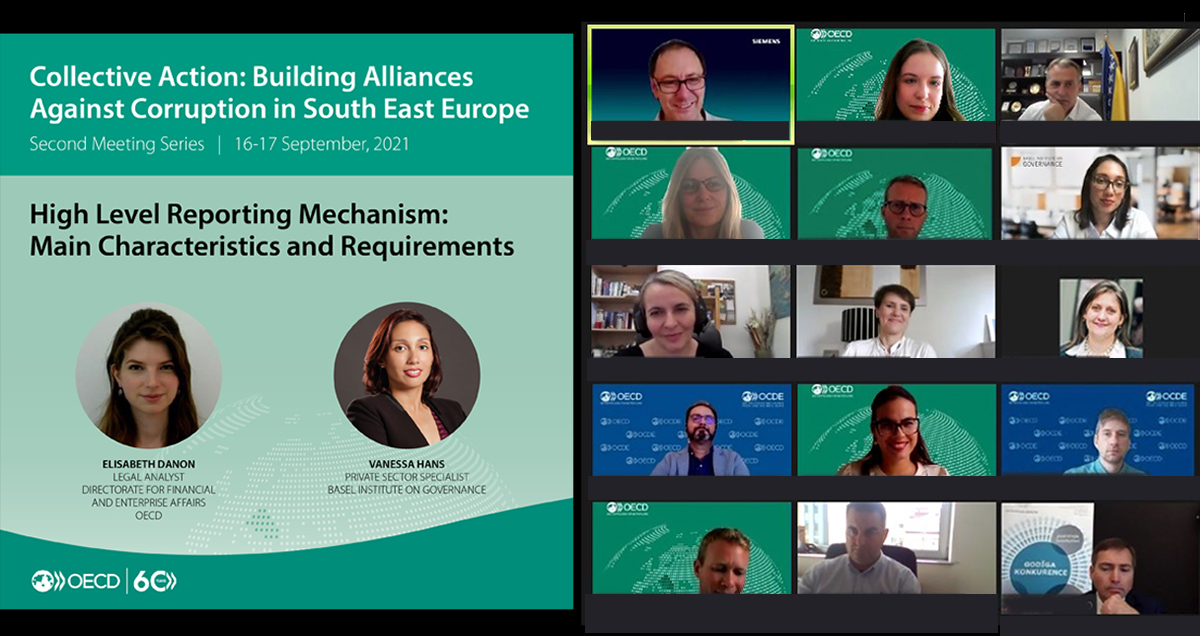How Collective Action can help improve business integrity in South East Europe

A guest blog by Elisabeth Danon, Legal Analyst, OECD Anti-Corruption Division.
How can governments in South East Europe partner with the vibrant business sector and civil society to help combat corruption?
OECD experts and practitioners shared some novel ideas on this question at a two-day webinar on Collective Action – Building Alliances Against Corruption in South East Europe on 16 and 17 September.
The event convened the Collective Action community in South East Europe to take stock of the advancement of the project Fair Market Conditions for Competitiveness in the Adriatic Region. This project is being conducted under the umbrella of the OECD South East Europe Regional Programme and is supported by the Siemens Integrity Initiative.
Improving business integrity in Serbia, Bosnia and Herzegovina, and Croatia
The three-year business integrity project aims to promote a level playing field and fair market conditions in Serbia, Bosnia and Herzegovina, and Croatia. All three countries have significant potential for strong and sustainable economic development, but are hampered by relatively high levels of perceived corruption.
Ambitioning to be a multi-stakeholder initiative, the project gathers government officials, business representatives, civil society and academia to address country-specific drawbacks by applying international standards. It aims to:
- raise awareness about OECD standards and good practices of anti-corruption, integrity and fair competition for competitiveness with governments, business and civil society;
- build capacity and foster the implementation of concrete OECD recommendations with regard to the transparency and efficiency of anti-corruption and competition authorities; and
- promote the latest knowledge on international standards and practices in the area of anti-corruption and integrity for competitiveness in academic curricula.
The September webinar, which was part of a series of events organised in the context of the project, consisted of a plenary roundtable on Instruments and Global Lessons for Implementing Collective Action, and three country-specific roundtables on Putting Collective Action Into Practice – Factors of Success.
Policy practitioners and experts from OECD countries shared practical experiences in implementing policy reforms to strengthen fair competition and combat corruption across the economy and society.
Among the OECD-supported instruments presented as a way to create a fair and competitive playing field was the High Level Reporting Mechanism (HLRM).
How HLRMs can provide early and pragmatic resolutions to integrity issues
The HLRM, jointly developed by the OECD and the Basel Institute of Governance, is a reporting mechanism created to effectively address complaints of bribery solicitation and related practices that involve public officials. Upon receipt of a complaint, the HLRM triggers a process of rapid analysis and pragmatic response on the part of a government.
Examples of different contexts can include:
- public procurement
- the issuance of commercial licenses
- tax refunds
- the release of goods by customs authorities.
The goal is to restore the status quo before a reported problem escalates further and to allow interactions between public and private stakeholders to proceed smoothly.
The HLRM can be customised according to the needs and reality of different countries – an essential feature of any Collective Action initiative. Representatives of the public sector, business, civil society and other stakeholders participate in its design and implementation.
The HLRM anticipates a whole-of-a-society approach to tackling corruption and enhancing public integrity as described in the 2017 OECD Recommendation of the Council on Public Integrity. By providing a tool to companies facing solicitation of bribes, the HLRM can also contribute to the fight against foreign bribery, driven at the global level by the OECD Convention on Combating Bribery of Foreign Public Officials in International Business Transactions.
To date, customised models of the HLRM have been deployed in Colombia and Argentina. During the roundtables, experts from the OECD and the Basel Institute on Governance provided insights on those existing models, and how the mechanism could be replicated in Serbia, Bosnia Herzegovina and Croatia, based on the priorities and specifies of each country.
By supporting Collective Action and implementing a HLRM, governments would be demonstrating their real commitment to the joint fight against corruption and their leadership in efforts to create a fair and clean business environment for all.



